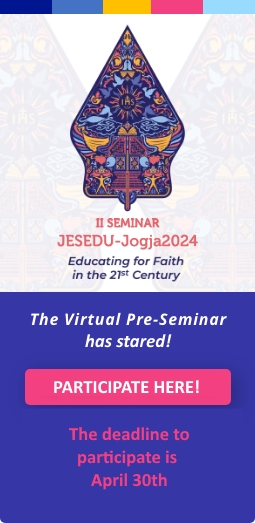We are delighted to share this interview with John Michael Reyes, Director of Adult Spirituality at St. Ignatius College Preparatory (USA), who participated as a facilitator in the Four Key Practices of Ignatian Spirituality course. This course is a facilitator-led global course that offers a new synchronous global learning experience for Ignatian educators. A new course modality that allows members of our global community to learn together in global groups with educators from different Jesuit schools around the world.
John’s participation as a facilitator not only contributed to delivering on the holistic vision of education offered by Jesuit schools but it has also helped us, as a community, to keep growing as contemporary Jesuit educators. Thank you John!
Without further ado here is John’s facilitation experience.
If you are interested in knowing more about our facilitation opportunities, please contact Géllert Merza at info@educatemagis.org
Q1. What is your full name, current job title, job responsibilities, school name, city and country where you work?
John Michael Reyes. Director of Adult Spirituality. St. Ignatius College Preparatory, San Francisco, CA, USA
Q2. Where were you born? Can you briefly share with us a special memory from your own biography that relates to your first interest (curiosity) in Christian faith and Jesuit/Ignatian spirituality?
San Francisco, CA. I was born into the world of liturgy. Even before I was born, my mother was active in the Art & Environment committee of my childhood (which is still her) parish. Sitting in church early, decorating or ironing, in the mornings are my earliest childhood memories.
I came to know Jesuit education (and spirituality) when I encountered the local Jesuit high school – now my place of employment – using my childhood church for their annual Mass of the Holy Spirit. It was then that I heard about St. Ignatius (the person) for the first time. (Fun fact: Little did I know the person coordinating the liturgy then held the same position as I am in now.)
Q3. What is your relationship to the Jesuit/Ignatian spirituality? How important is it for your life, your personal ethos, to work for or be part of the Jesuit/Ignatian global community?
I have attended and worked in Jesuit Universities, namely Santa Clara University, Loyola University Chicago, and the Jesuit School of Theology of Santa Clara University. Ignatian Spirituality is important for me because of its practicality. The practicality of this spirituality is that God is continually present, laboring for creation and for me becomes concrete when I remember my experiences with the Exercises, e.g. the Contemplation to Attain Divine Love. So as a person of faith, I embrace there is an ongoing dialogue between God and me and that my faith impels me to really take that to heart.
Q4. Based on your personal experience, and your participation and facilitation of the Four Key Practices of Ignatian Spirituality course how do you feel it integrates with the global context of the document “Jesuit Schools: A Living Tradition in the 21st Century”?
The experience and practices afforded with the course allowed me to refresh myself in important tenets of Ignatian Spirituality. To encounter others around the world with various degrees of exposure to things that many in Ignatian circles take for granted, reminded me that this course is important for the mission of each Jesuit school so that there is a common language, a common mission, and an understanding of what we do and why we do it. For example, many Jesuit institutions pray the Examen, and many assume they do it just because “we are a Catholic school” as if to check off a box. But, through this course, I have come to realize why it’s important. In liturgical theology there is an axiom: “lex orandi, lex credendi, lex vivendi” which roughly translates into “how we pray, shows us what we believe and therefore how to live.” The Examen teaches us that we believe in a God who loves us beyond our comprehension, and by looking back at the spiritual movements of our lives, we can see ourselves moving towards (and ask for the grace to) becoming contemplatives in action.
Q5. What other examples of global education projects or intercultural initiatives can you share with us from your own past in which you have been involved and what would you like to be involved in in the future?
My passion has existed in the realms of liturgy and the catechumenate, so my current position is different from my usual “job” which went from coordinating to more listening. I am responding in a way that is not really new but goes deeper in terms of how I am living out my baptism. Would there be any interest in exploring liturgical spirituality through a lens of Ignatian spirituality? Or how the catechumenate can inspire Ignatian spirituality and vice versa?
Q6. What has been your experience so far (positive/challenging aspects) in your active participation as a participant and facilitator in the Ignatian Spirituality course cohorts hosted by Educate Magis?
One of the graces is connecting with others and this cannot be more evident that in my collaborative efforts with Elliott, Jen, and Gellért. The global connection has become more palpable, and now I have friends for my ongoing pilgrimage in ministry. Another is a richer understanding of spiritual conversations especially in light of the recent synod process.
Q7. Why do you think (if you do) it is important for Jesuit educators to learn about, practice and model Ignatian practices, such as the Examen, Discernment, Spiritual Conversation and being Contemplatives in Action in Jesuit schools around the world?
See question 4.
Q8. What is your favourite quote/phrase related to Ignatian Spirituality, from a historical or a modern figure that you admire?
“Everything is connected.” – Laudato Si, Pope Francis, 91.
